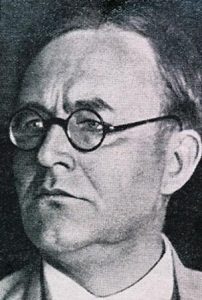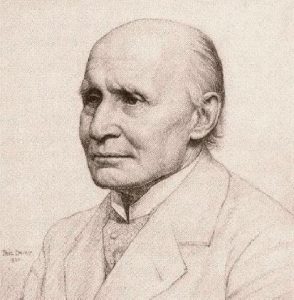The first writings : towards a dialectical theology
In 1919, Barth began his written work with his Commentary on the Epistle to the Romans, which was often re-published, and was the first commitment to a renewal of theological thinking. Then came works on the history of Theology in the 18th and 19th centuries. He showed that theology, by relinquishing the affirmation of Revelation as the unique source, also relinquished the basis of its autonomy and gave in to religious anthropology and inward virtues. That step led to the reasons for an unavoidable return to a theology that should keep its specificity from philosophy, History and social sciences. But it should also take into account the arguments specific to these subjects and the results of their implementation. Theology should not just witness to “the ethical failure of modern theology”, illustrated in the distress of the world in the 1914 war, and in all the present sufferings which may remain undetected. Such a requirement put an end to certainties. Reflection could no longer be at a standstill, but be part of a dialectical reflection which can be Jacob’s fight with the angel. “The content of the Bible does not merely consist in the right conceptions man has of God, but in the right opinions God has of man… It is God’s Word in the Bible” – in Karl Barth The word of God, the word of man, French edition in 1934.
Dogmatics (church)
The commentary on Saint Anselm in 1930 was a presentation of God wholly other, which can be considered as a prelude to his opus magnum, i.e. the 26 volumes of his famous Church Dogmatics (1932-1967) translated into French almost in real time by Fernand Ryser between 1953 and 1980. Dogmatics is ecclesiastical as a critical reading of the preaching of the Church, because it serves everlasting preaching rooted in contemporary history. Deciphering the Bible message concerning our times is what matters. He could not complete his work before dealing with Redemption, which concerns the relation between God and man, God and men, and the illustration of Christological meditation in its humanity. It does so at different levels, especially related to “sola fide” and “sola scriptura”, and to their record in the life of the Church, etc. In this perspective, theology is not an alternative to progress in sciences and techniques, but on the contrary it improves a wider opening to the richness of multi-subjects. Thus it takes into account the riches the secular world can offer, its dynamism, but it also deciphers the chimeras, including those which could be mistaken for a moral rule. All Karl Barth’s teaching material in Basel from 1935 to 1962 was the contents of Dogmatics .
Lectures, articles, essays
To the monumental theological basis, were added many essays and volumes of articles or lectures among which the French translation of The word of God and the word of man in 1933 -published in Germany in 1924. A Swiss voice from 1939 to 1944, and Credo dedicated to his friends of the confessing Church in 1936, reasonable worship in 1934, Christian community, civil community in 1945. In 1957 the French translations of God’s Humanity was published. It is a rather concise work in which knowing the wholly other God implies caring for men but also for their sufferings. That knowledge is only possible through meditation on Jesus-Christ, wholly God, but also wholly man. Finally Evangelical theology, an Introduction which was the last class he taught in Basel in 1962.
In 1956, Barth wrote a homage to Mozart to celebrate the bicentennial of his birth, and wrote “I am not sure angels play Bach’s music when they worship God, but I am sure that they play Mozart among themselves and that God particularly enjoys listening to them.”
A lot of books and essays were also written about the theologian and his work, notably by Father Urs von Balthazar, who fervently attended his classes at Basel University, and by Hans Küng with The justification. Karl Barth’s doctrine and a catholic reflection published by Desclée de Brouwer in 1965.






